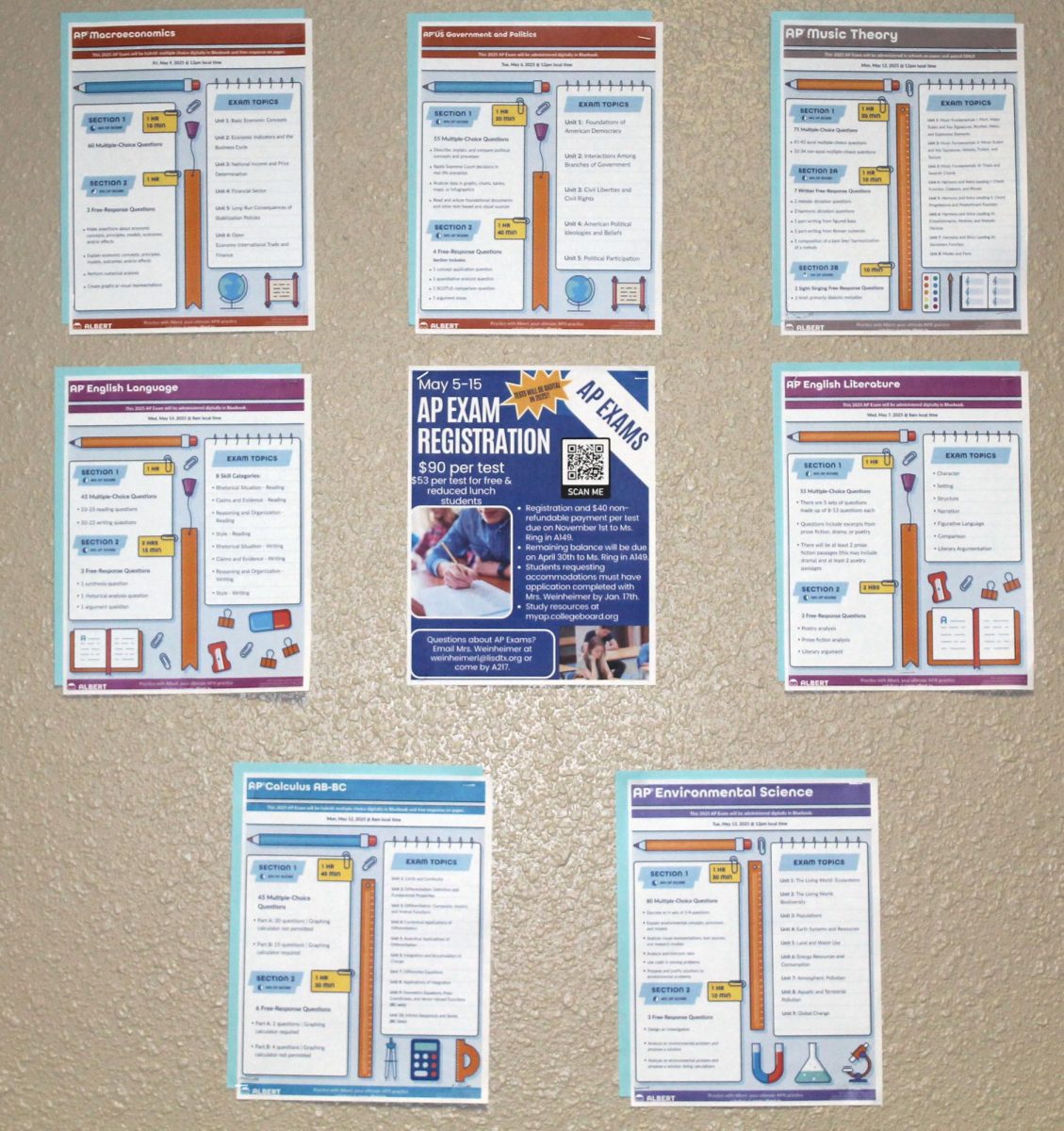All students planning to take AP exams must complete the registration form available on Canvas and pay a non-refundable fee of $40 per test to bookkeeper Amanda Ring in room A149 by the end of today.
The worldwide deadline for all AP exam registrations, other than AP economics, is Nov. 15.
“I set it to close on November 1, so that I can make sure everybody puts their name, birthday and numbers in right,” testing and accountability coordinator Lori Weinheimer said. “I have to add everybody’s TSDS number and other things like that to make sure everything’s correct before I submit the final order.”
AP English IV teacher Nathaniel Brayton said the early deadline for AP exam registrations pushes students to work hard in class.
“AP wants people to commit to their test,” he said. “That way they’ll work harder in their classes and not kind of blow it off until the last minute and be wishy-washy when it comes May.”
Students who take AP exams are able to receive college credit, depending on the college, if they receive a 3 or higher on their exam.
“[AP students] are more prepared for college, and are more prepared for life, even if they’re not going to go to college,” AP English III teacher Dondi Hinds said. “[AP classes] are about teaching [students] how to think about things in a different way, how to find their voice and how to create a solid argument that’s backed up by evidence, and that’s a life skill.”
Senior Ruby Wiseman is currently taking her second AP class, AP English IV, and said it’s been going great.
“I love Mr. Brayton so much and I feel like his class is preparing me to do well on the test,” she said. “It’s encouraging to know that he has a high percent pass rate.”
This year will be the first time that all AP exams, other than music theory, will be online through the digital testing app Bluebook.
“I think the November deadline has always been so early because they used to have to print all the tests,” Weinheimer said. “They want to know how many kids are going to take the tests, so they know how many copies of the test to make, so that they can ship it to the school, and all that takes time. I’m hoping now that we’re moving everything digitally, that they’ll re-look at those deadlines for upcoming years.”
The deadline to apply for testing accommodations such as 504 or Special Education is Jan. 17. Students who may have these accommodations are encouraged to see Weinheimer in room A217.
“[Accommodations] have to be approved by College board,” Weinheimer said. “If a kid gets accommodations through a committee, they need to come in and have their parents give permission. Then we file an application on behalf of the kid asking for those accommodations and attach their education plan from their committee for the College Board to review.”
Students taking exams that require mathematical equations or written responses, like AP environmental science or calculus, will receive a small spiral notebook for their work.
“For example, the calculus kids will work out the calculus problem, and then that little book of paper will be sent back to the College Board, like paper tests were,” Weinheimer said.
The remaining balance for the tests are due April 30. Each test is $90 or $53 for students with free or reduced lunch.
“I think some people get nervous about how much it costs, but if you think about taking a college class it would cost you hundreds of dollars, were you’re paying 90 just for the test,” Weiheimer said. “So if you think you have a good shot of passing it, it’s way cheaper to go ahead and pay $90 and take the test and get the credit than it is to pay hundreds of dollars to take a class in college.”
Junior Lydia Skiles said her first AP class [AP English III] has been pretty easy.
“It has a lot of annotating and goes more in depth into what we are reading,” she said. “I’m a little scared but I think I’ll be fine. I’m worried about not understanding some of the stories but I think I’ll be able to figure it out.”
Brayton said the biggest difference between his on-level and AP students is the amount of engagement.
“There’s a different type of goal that the AP students have than the on-level students,” he said. “For example, both my on-level and my AP read Othello, but my AP spends more time with it. We get to discuss more of the themes and the topics. I feel like they get a more enhanced, enriched, wide view of the text we’re reading. AP students are more willing to and more authentically engaged with the text. They find it more interesting, and they want to learn more.”
Hinds said that she loves the fact that AP classes are offered on campus.
“I know we have college level classes where students can get those credits, but I believe that the AP classes really push them in the way that others don’t,” she said. “OnRamps [college level courses] are hard classes, and it really gives [students] the experience of what it’s going to be like to have a professor. But because [the students] are still in high school, I think that having a class were we are still treating them like they’re in high school, while pushing them to understand what college is going to be like is important.”







